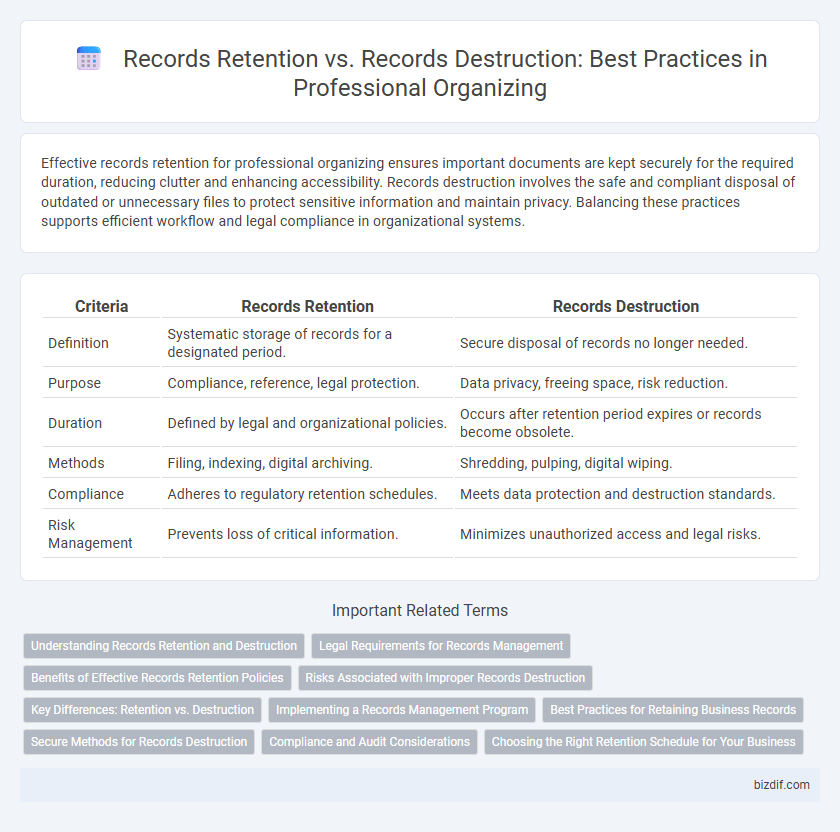Effective records retention for professional organizing ensures important documents are kept securely for the required duration, reducing clutter and enhancing accessibility. Records destruction involves the safe and compliant disposal of outdated or unnecessary files to protect sensitive information and maintain privacy. Balancing these practices supports efficient workflow and legal compliance in organizational systems.
Table of Comparison
| Criteria | Records Retention | Records Destruction |
|---|---|---|
| Definition | Systematic storage of records for a designated period. | Secure disposal of records no longer needed. |
| Purpose | Compliance, reference, legal protection. | Data privacy, freeing space, risk reduction. |
| Duration | Defined by legal and organizational policies. | Occurs after retention period expires or records become obsolete. |
| Methods | Filing, indexing, digital archiving. | Shredding, pulping, digital wiping. |
| Compliance | Adheres to regulatory retention schedules. | Meets data protection and destruction standards. |
| Risk Management | Prevents loss of critical information. | Minimizes unauthorized access and legal risks. |
Understanding Records Retention and Destruction
Records retention involves systematically storing documents for a legally or operationally required period to ensure compliance and accessibility. Records destruction refers to the secure and permanent disposal of records once they have met retention requirements, minimizing risks related to data breaches and clutter. Understanding the balance between retention schedules and timely destruction is essential for efficient information management and regulatory adherence in professional organizing.
Legal Requirements for Records Management
Legal requirements for records management mandate specific retention periods based on industry regulations, such as HIPAA for healthcare or the Sarbanes-Oxley Act for financial records, ensuring compliance and minimizing liability. Records retention schedules must be clearly defined and consistently followed to avoid penalties and facilitate audits. Proper documentation of records destruction, including certificates of destruction, is crucial to prove adherence to legal obligations and protect sensitive information.
Benefits of Effective Records Retention Policies
Effective records retention policies streamline document management, ensuring compliance with legal regulations and reducing the risk of data breaches. They optimize storage space, lower costs by preventing unnecessary retention, and enhance retrieval efficiency for critical business information. Proper retention schedules support audit readiness and preserve organizational knowledge by systematically archiving important records.
Risks Associated with Improper Records Destruction
Improper records destruction can lead to significant legal liabilities, including violations of data protection regulations such as GDPR and HIPAA, which impose strict penalties for mishandling sensitive information. Retaining records beyond their required retention period increases storage costs and risks data breaches, while premature destruction may result in the loss of critical documentation needed for audits, litigation, or compliance verification. Organizations must implement clear policies for records retention versus destruction, leveraging secure shredding and digital deletion methods to mitigate risks associated with data exposure or regulatory non-compliance.
Key Differences: Retention vs. Destruction
Records retention involves systematically maintaining important documents for legal, financial, or operational purposes, ensuring compliance with regulatory requirements and facilitating easy retrieval. Records destruction is the secure and permanent elimination of documents that no longer hold value or are beyond their retention period, minimizing risk of data breaches and reducing storage costs. Understanding key differences between retention and destruction is essential for effective records management policies and organizational efficiency.
Implementing a Records Management Program
Implementing a Records Management Program ensures clear policies for records retention and records destruction, aligning document lifecycles with legal, regulatory, and operational requirements. Effective retention schedules minimize storage costs and enhance retrieval efficiency, while systematic destruction safeguards sensitive information and mitigates compliance risks. Integrating digital tools and employee training further supports consistent enforcement and audit readiness in professional organizing environments.
Best Practices for Retaining Business Records
Best practices for retaining business records emphasize compliance with industry-specific regulations and legal requirements to determine appropriate retention periods. Organizing records by type, date, and relevance ensures efficient retrieval and minimizes risk of data loss or breaches. Implementing a systematic review process facilitates timely records destruction, preventing unnecessary storage costs while maintaining essential documentation.
Secure Methods for Records Destruction
Secure methods for records destruction are essential to protect sensitive information and comply with privacy regulations such as HIPAA and GDPR. Techniques like shredding, incineration, and secure digital deletion ensure that confidential data is irreversibly destroyed, preventing identity theft and data breaches. Professional organizers recommend using cross-cut shredders or certified document destruction services to maintain compliance and safeguard personal and business records.
Compliance and Audit Considerations
Records retention policies ensure organizations maintain essential documents in accordance with legal and regulatory requirements, facilitating smooth audit processes and compliance verification. Proper records destruction, conducted securely and systematically, mitigates risks of data breaches and legal penalties by preventing unauthorized access to sensitive information. Adhering to compliance standards such as GDPR, HIPAA, or SOX requires a balanced approach between retention schedules and timely destruction to uphold audit readiness and data integrity.
Choosing the Right Retention Schedule for Your Business
Choosing the right records retention schedule is crucial for regulatory compliance and efficient business operations, balancing legal requirements with operational needs. Retention schedules vary by industry regulations, including IRS guidelines for tax documents and HIPAA for health records, ensuring sensitive data is stored appropriately before secure destruction. Implementing a clear retention policy minimizes risks of data breaches, reduces storage costs, and facilitates timely records destruction aligned with legal mandates.
Records retention vs Records destruction Infographic

 bizdif.com
bizdif.com